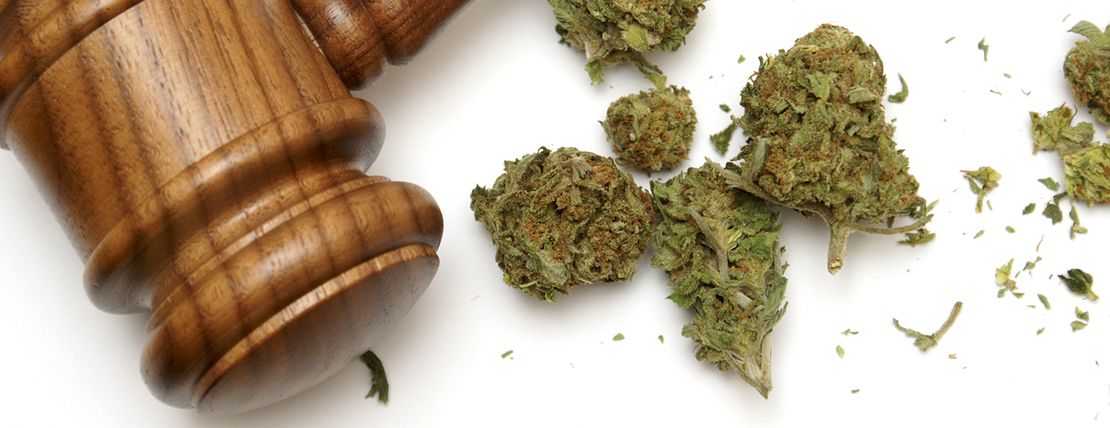- New Jersey joins a growing list. New Jersey legalized the use of recreational marijuana in April, making it the 18th state along with the District of Columbia to adopt full legalization.
- Workplace protections. New Jersey is one of approximately six states with state statutory protections for recreational users. New Jersey employers generally cannot take adverse employment actions solely on the basis of an individual’s recreational use of marijuana.
- Competitive advantage. With the continuing pandemic, there could be recruitment advantages for having a more tolerant stance on marijuana use and testing.
- Improved testing needed. Current drug testing technology detects cannabis in one’s body for up to 30 days after the drug is consumed. As such, it remains difficult to measure current employee impairment or intoxication, regardless of if the employee is working remotely or on site.
- Train managers, emphasize education. Employers should train their supervisors about the signs of impairment and how to document that evidence. This evidence is important should an employer have to show that it terminated the employee because it reasonably and honestly believed the employee was impaired, not simply because of a positive test.
Ten years ago, Washington and Colorado became the first U.S. states to legalize the recreational use and sale of marijuana. Since then, almost 20 states have done the same, and last month, New Jersey became the latest one to join the list.
As reported by the New York Times, at least a half-dozen medical marijuana dispensaries opened their doors to all adults on April 21, after winning final approval from New Jersey’s Cannabis Regulatory Commission.
Gov. Philip D. Murphy called the move a “historic step” in creating a new cannabis industry. According to a press release, the first day of adult-use sales resulted in a total gross sale of nearly $1.9 million.
But from an employer’s perspective, there will be different sorts of impact.
“In New Jersey, there are state statutory workplace-related protections for both medical and recreational marijuana users,” said Justine L. Abrams, an associate at Ogletree Deakins, based out of Morristown, New Jersey. “New Jersey is one of [a handful of states] with state statutory protections for recreational users. New Jersey employers generally cannot take adverse employment actions solely on the basis of an individual’s recreational use of marijuana.”
“Employers can expect an increase in lawsuits by applicants or employees claiming that they were fired, not hired, or suffered some other adverse action, solely because it was determined that they use recreational marijuana.”
Michael Palmer, a partner at Barnes & Thornburg, said, “Employers must continue to balance conflicting (or at least inconsistent) federal and state and local regulations with regard to maintaining a zero tolerance for marijuana use policy and marijuana testing.”
“Marijuana remains illegal at the federal level,” he continued. “Therefore, under federal rules, employers may maintain a zero-tolerance policy and terminate employees who test positive for marijuana, whether they are impaired at work or not. Moreover, federal law does not prohibit employers from conducting post-offer, pre-hire and random marijuana testing.”
But given that more states have now legalized marijuana use for recreational and medicinal purposes, should employers rethink their testing policies in today’s tight labor market?
Gaining Acceptance, New Challenges
According to Cheryl Brown Merriwether, executive director of the International Center for Addiction & Recovery Education, there has been an increased acceptance among the general public that marijuana should be legal. A recent Gallup poll, for example, indicated that 68% of Americans support the legalization of marijuana, while nearly half of adults have tried marijuana.
With the continuing pandemic, there could be recruitment advantages for having a more tolerant stance on marijuana use and testing.
“It comes down to this,” Merriwether said. “Drug tests are typically not administered while an employee is ‘on the clock.’ Drug tests (when administered) are done most often as part of a pre-employment drug screen, or after an accident or other critical incident occurs on the job.
“Therefore, even if an employee fails a drug test, it does not prove that the individual was impaired while they were working on the job. Drug testing methods for marijuana are not yet developed to the point where they are able to measure an individual’s level of intoxication in the same way that a breathalyzer test does for alcohol. Current tests can detect than an individual has used marijuana at some point in time, but does not measure the level of intoxication, which can vary significantly due to individual circumstances.”
Palmer added, “Having a strict zero-tolerance approach limits your labor pool. That said, employer drug testing and drug policies exist for good reasons [to improve workplace safety, to improve worker productivity, etc.] So, it’s not a one-size-fits-all issue. Employers need to evaluate their industry and risks to figure out what’s best for them.”
Abrams agreed that employers should reconsider how they conduct their testing polices.
“Before the legalization of recreational marijuana, many employers, particularly those employing individuals in safety-sensitive functions, such as machine operators, required that their employees’ drug tests yield a negative result for marijuana,” she said. “Now, although drug testing is generally still permitted, employers are generally prohibited from taking adverse actions against employees or job applicants based solely on a positive test for marijuana.”
And with a more remote workforce, new challenges have arisen for employers in measuring impairment and intoxication for their employees.
According to Abrams, there isn’t any reliable technology to test individuals for current marijuana use, impairment, or intoxication.
“Current drug testing technology detects cannabis in one’s body for up to 30 days after the drug is consumed. As such, it remains difficult to measure current employee impairment or intoxication, regardless of if the employee is working remotely or on site,” she said.
Abrams said New Jersey’s recreational marijuana law, The Cannabis Regulatory, Enforcement Assistance, and Marketplace Modernization Act (CREAMMA), tasks the New Jersey Cannabis Regulatory Commission with adopting standards for training and certifying Workplace Impairment Recognition Experts (WIREs) to detect and identify an employee’s usage of, or impairment from, marijuana.
“Until we have reliable drug tests that can test for current impairment, WIREs will serve as employers’ source for detecting marijuana impairment on the job,” she said.
Palmer also explained that a positive test isn’t conclusive evidence of impairment, and employers must rely on other evidence of impairment if they have an impairment-based policy.
“Employers should train their supervisors about the signs of impairment and how to document that evidence,” he said. “This evidence is important should an employer have to show that it terminated the employee because it reasonably and honestly believed the employee was impaired, not simply because of a positive test.”
According to Merriweather, organizations such as the International Center for Addiction and Recovery Education (ICARE) provide employers with access to Certified Addiction Awareness Facilitators (CFAAs) and Certified Professional Recovery Coaches (CPRCs).
“These professional facilitators and coaches are qualified to deliver webinars, workshops and other training to educate the workforce about the use of marijuana, alcohol, and other substances in the workplace,” she said.
In addition, the Drug-Free American Foundation and the National Drug-Free Workplace Alliance have prepared a Marijuana in the Workplace Toolkit. This 10-page document is filled with information designed to help employers review their programs, policies, rules and procedures in relation to applicable laws, regulations and statutes.
“Marijuana in the workplace is convoluted, confusing and hard to navigate,” Merriweather said. “The good news is that there are resources available to help employers prepare for the storm.”








